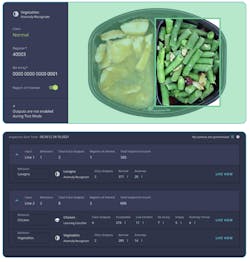Since 1958, apetito has been supplying frozen foods and ready-to-eat meals to schools, nurseries, businesses, hospitals, and retirement homes across Europe and Canada. Production of its meal trays involves placement of different food items into trays for shipping and delivery. Complaints from customers about missing food items from trays led the company to seek an automated approach to final product inspection.
In its initial attempt to correct this problem, apetito began weighing each tray as it came off the production line. However, this did not adequately address the problem because if one food item on the tray was a little heavier than usual, it could falsely account for what was missing. In addition, apetito wanted to address other assembly efficiencies, such as ensuring each lid on its dessert containers is properly crimped and secured.
Starting with Raspberry Pi
One of the first steps apetito took to automate visual inspections was to apply a Raspberry Pi-based system to monitor one production lane. Photos of good and unacceptable products informed models connected to an output signal in the control system that would push rejects off the line. Without needing a human to do this job, the company saved more than £15,000 in labor costs per year.
The problem with the Raspberry Pi system is that it required hundreds of pictures of its products that had to be uploaded to a USB drive and then transferred to a computer to train the system over the course of three to four hours. The resulting knowledge then had to be transferred back to the line.
Whenever apetito made changes to its meal production operations to maintain appropriate stock levels, new training processes were required for the Raspberry Pi system.
Though the Rasperry Pi system was not scalable or flexible enough for apetito’s needs, it helped the company realize how AI could help apetito save on costs and more adequately detect production problems.
AI-based inspection
Neurala, a supplier of AI (artificial intelligence)-based visual inspection technology, began working with apetito to detect cases of the five most reported missing components from meal trays using Neurala’s Vision Inspection Automation (VIA) software. VIA consists of two software programs, Inspector and Brain Builder. Using these programs, apetito was able to build anomaly-detecting systems in 10-20 minutes and immediately begin testing.
To data, Neurala and apetito have built 30 AI “brains” across apetito’s plant to detect various food components used in various food trays. For example, one “brain” developed to identify missing Yorkshire pudding components achieved 100% accuracy at the end of testing, assuring apetito can detect their most frequent missing component without fail.
Kevin McDonagh, operations manager at apetito said, “Throughout this AI-building journey, we’ve spoken with other companies in similar situations and are yet to find anybody in the food industry that is leveraging AI like we are with Neurala. We’re very much breaking new ground together.”


